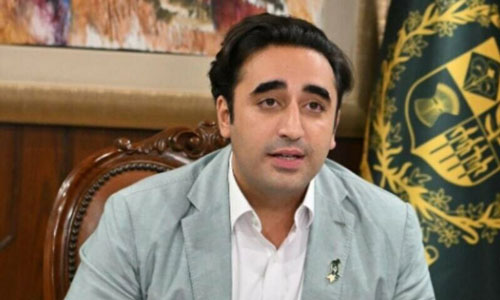FM believes Pakistan to remain in high risk security phase until question of terror threats from Afghanistan addressed
The new military and civilian leadership of the country has put former premier Imran Khan’s “policy of appeasement” towards militant groups to an end, Foreign Minister Bilawal Bhutto-Zardari said in a recent interview with a US TV channel.
“The unity government is clear, the new military leadership is clear […] We have put a full stop to the policy of appeasement and we are confident of taking on the terrorist groups functioning in Pakistan,” the foreign minister told CNBC International.
He, however, said that Pakistan will remain in a “high risk” security phase until the question of the terrorist threats emanating from Afghanistan is addressed.
With reference to the history of military rule, Bilawal was of the view that Pakistan’s history is not hidden from anyone and for more than half of its past, the country had been under military rule.
He said that Pakistan was going through a transitionary phase. “Imran Khan was ousted via a vote of no-confidence, which was the first time in its history that Parliament removed a prime minister in a democratic way,” he said.
And in this process, neither did the judiciary nor did the military play its role in the matter, he added.
The foreign minister said that former army chief Gen (retd) Qamar Javed Bajwa had admitted publicly — while in office — the intervention of the military in politics throughout history.
“If the military says it wants to change its controversial conduct constitutionally, it should be welcomed,” Bilawal said.
The PPP chair told CNBC that “our opposition thinks that the military should play its role in politics.
“They want the military to help bring them back to power.” Bilawal said that he would encourage Imran Khan to take the democratic course.
“He [Khan] will most certainly have a future in politics […] if he changes his protest from ‘come intervene in politics’. Unfortunately, I don’t see that happening,” the FM said.
While responding to a question regarding the statement about Pakistan’s bankruptcy made by Defence Minister Khawaja Asif, Bilawal said: “He was talking in a political context at a political gathering and he was referring to harsh economic times rather than speaking technically. He was talking in the overall context of the country.”
On the recent floods in the country, Bilawal said that five million acres of standing crops were destroyed, which had caused a loss of a huge chunk of Pakistan’s GDP, leaving the country in extreme difficulty.
“The economic climate of Pakistan is tough. And the cherry on top, we are facing a fresh wave of terrorism we have seen since the fall of Kabul,” the minister highlighted.
“We witnessed a steady uptick in recent terrorist activity, such as the attack in Peshawar where we lost almost a hundred lives and just two days ago the attack in the commercial capital [Karachi] in broad daylight. Karachi’s regional police station was attacked. The police have successfully thwarted the attack but the fact is these things are happening.”
In response to the question of 30% of Chinese debt, the foreign minister stated that Pakistan owes debts to a lot of countries and international financial institutions.










